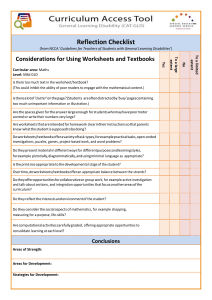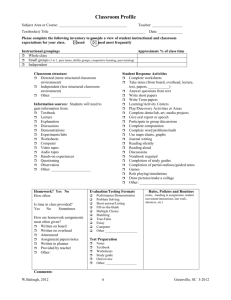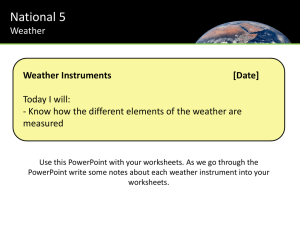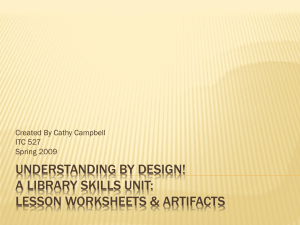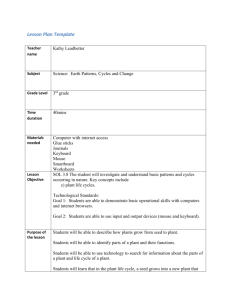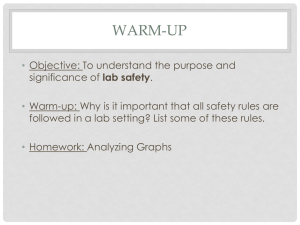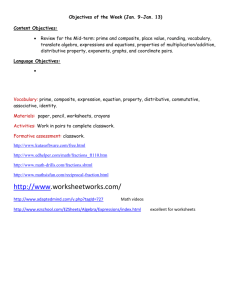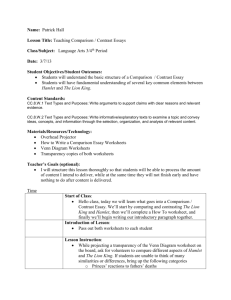2/16-2/20 Goals with Smart Art Diagrams
advertisement
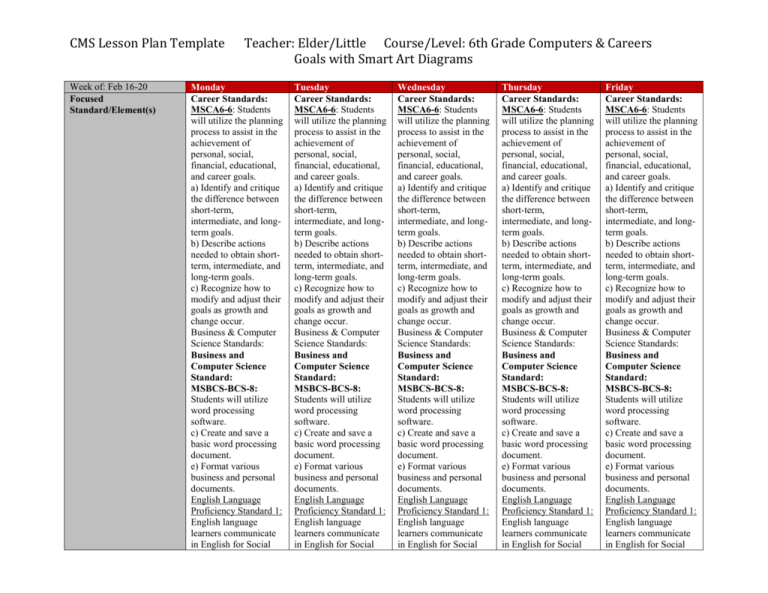
CMS Lesson Plan Template Week of: Feb 16-20 Focused Standard/Element(s) Teacher: Elder/Little Course/Level: 6th Grade Computers & Careers Goals with Smart Art Diagrams Monday Career Standards: MSCA6-6: Students will utilize the planning process to assist in the achievement of personal, social, financial, educational, and career goals. a) Identify and critique the difference between short-term, intermediate, and longterm goals. b) Describe actions needed to obtain shortterm, intermediate, and long-term goals. c) Recognize how to modify and adjust their goals as growth and change occur. Business & Computer Science Standards: Business and Computer Science Standard: MSBCS-BCS-8: Students will utilize word processing software. c) Create and save a basic word processing document. e) Format various business and personal documents. English Language Proficiency Standard 1: English language learners communicate in English for Social Tuesday Career Standards: MSCA6-6: Students will utilize the planning process to assist in the achievement of personal, social, financial, educational, and career goals. a) Identify and critique the difference between short-term, intermediate, and longterm goals. b) Describe actions needed to obtain shortterm, intermediate, and long-term goals. c) Recognize how to modify and adjust their goals as growth and change occur. Business & Computer Science Standards: Business and Computer Science Standard: MSBCS-BCS-8: Students will utilize word processing software. c) Create and save a basic word processing document. e) Format various business and personal documents. English Language Proficiency Standard 1: English language learners communicate in English for Social Wednesday Career Standards: MSCA6-6: Students will utilize the planning process to assist in the achievement of personal, social, financial, educational, and career goals. a) Identify and critique the difference between short-term, intermediate, and longterm goals. b) Describe actions needed to obtain shortterm, intermediate, and long-term goals. c) Recognize how to modify and adjust their goals as growth and change occur. Business & Computer Science Standards: Business and Computer Science Standard: MSBCS-BCS-8: Students will utilize word processing software. c) Create and save a basic word processing document. e) Format various business and personal documents. English Language Proficiency Standard 1: English language learners communicate in English for Social Thursday Career Standards: MSCA6-6: Students will utilize the planning process to assist in the achievement of personal, social, financial, educational, and career goals. a) Identify and critique the difference between short-term, intermediate, and longterm goals. b) Describe actions needed to obtain shortterm, intermediate, and long-term goals. c) Recognize how to modify and adjust their goals as growth and change occur. Business & Computer Science Standards: Business and Computer Science Standard: MSBCS-BCS-8: Students will utilize word processing software. c) Create and save a basic word processing document. e) Format various business and personal documents. English Language Proficiency Standard 1: English language learners communicate in English for Social Friday Career Standards: MSCA6-6: Students will utilize the planning process to assist in the achievement of personal, social, financial, educational, and career goals. a) Identify and critique the difference between short-term, intermediate, and longterm goals. b) Describe actions needed to obtain shortterm, intermediate, and long-term goals. c) Recognize how to modify and adjust their goals as growth and change occur. Business & Computer Science Standards: Business and Computer Science Standard: MSBCS-BCS-8: Students will utilize word processing software. c) Create and save a basic word processing document. e) Format various business and personal documents. English Language Proficiency Standard 1: English language learners communicate in English for Social and Instructional purposes within the school setting. and Instructional purposes within the school setting. and Instructional purposes within the school setting. and Instructional purposes within the school setting. and Instructional purposes within the school setting. Essential Question(s) What are goals and why are they important? What is the difference between short term, intermediate and long term goals? What is prioritizing? Who is responsible for making changes to your goals? What are barriers? How do you create a smart art diagram in Microsoft Word? What is a basic radial diagram? What are goals and why are they important? What is the difference between short term, intermediate and long term goals? What is prioritizing? Who is responsible for making changes to your goals? What are barriers? How do you create a smart art diagram in Microsoft Word? What is a basic radial diagram? What are goals and why are they important? What is the difference between short term, intermediate and long term goals? What is prioritizing? Who is responsible for making changes to your goals? What are barriers? How do you create a smart art diagram in Microsoft Word? What is a basic radial diagram? What are goals and why are they important? What is the difference between short term, intermediate and long term goals? What is prioritizing? Who is responsible for making changes to your goals? What are barriers? How do you create a smart art diagram in Microsoft Word? What is a basic radial diagram? What are goals and why are they important? What is the difference between short term, intermediate and long term goals? What is prioritizing? Who is responsible for making changes to your goals? What are barriers? How do you create a smart art diagram in Microsoft Word? What is a basic radial diagram? Opening (5-10 min) Students will have journal topics related to the content that they are learning for the week. Monday, students have a “research topic” to discover the content of the current topic. If a student finishes before guided instruction, they work on Micro-type lessons and practice for weekly tests. Students will insert at KWL Table about "Goals". Students will list what they already know about their future goals and what they want to learn or need to know so they can achieve their goals. Students have an instructional warm-up each day. They have journal topics related to the content that they are learning for the week. If a student finishes before guided instruction, they work on Micro-type lessons and practice for weekly tests. (Writing Initiative) Students have an instructional warm-up each day. They have journal topics related to the content that they are learning for the week. If a student finishes before guided instruction, they work on Micro-type lessons and practice for weekly tests. Students have an instructional warm-up each day. They have journal topics related to the content that they are learning for the week. If a student finishes before guided instruction, they work on Micro-type lessons and practice for weekly tests. Students have an instructional warm-up each day. They have journal topics related to the content that they are learning for the week. If a student finishes before guided instruction, they work on Micro-type lessons and practice for weekly tests. Work-Time Activities (40 min) Closure Activity (10 min) Discussion of topics covered in class. Demonstration of learned keyboarding and computer skills. Discussion will include the students answering essential questions. Discussion of topics covered in class. Demonstration of learned keyboarding and computer skills. Discussion will include the students answering essential questions. Discussion of topics covered in class. Demonstration of learned keyboarding and computer skills. Discussion will include the students answering essential questions. Discussion of topics covered in class. Demonstration of learned keyboarding and computer skills. Discussion will include the students answering essential questions. Discussion of topics covered in class. Demonstration of learned keyboarding and computer skills. Discussion will include the students answering essential questions. Assessment/Evaluation Rubric attached to worksheets and projected on screen. Performance Assessment while monitoring student’s progress. Portfolio Assessment Rubric attached to worksheets and projected on screen. Performance Assessment while monitoring student’s progress. Portfolio Assessment Rubric attached to worksheets and projected on screen. Performance Assessment while monitoring student’s progress. Portfolio Assessment Rubric attached to worksheets and projected on screen. Performance Assessment while monitoring student’s progress. Portfolio Assessment Rubric attached to worksheets and projected on screen. Performance Assessment while monitoring student’s progress. Portfolio Assessment Differentiation (targeting student growth) Refer to IEP/Extended time/buddy helpers/On Your Own Projects/Exploration of Computer Skills Projects designed for all learning styles: kinesthetic, auditory, and visual Students with vision problems will use the magnification tool on the computer as well as have enlarged worksheets and a keyboard with enlarged keys. Peer Teaching: Students are encouraged to help other students when learning computer skills and career content. Refer to IEP/Extended time/buddy helpers/On Your Own Projects/Exploration of Computer Skills Projects designed for all learning styles: kinesthetic, auditory, and visual Students with vision problems will use the magnification tool on the computer as well as have enlarged worksheets and a keyboard with enlarged keys. Peer Teaching: Students are encouraged to help other students when learning computer skills and career content. Refer to IEP/Extended time/buddy helpers/On Your Own Projects/Exploration of Computer Skills Projects designed for all learning styles: kinesthetic, auditory, and visual Students with vision problems will use the magnification tool on the computer as well as have enlarged worksheets and a keyboard with enlarged keys. Peer Teaching: Students are encouraged to help other students when learning computer skills and career content. Keyboarding lessons in Refer to IEP/Extended time/buddy helpers/On Your Own Projects/Exploration of Computer Skills Projects designed for all learning styles: kinesthetic, auditory, and visual Students with vision problems will use the magnification tool on the computer as well as have enlarged worksheets and a keyboard with enlarged keys. Peer Teaching: Students are encouraged to help other students when learning computer skills and career content. Refer to IEP/Extended time/buddy helpers/On Your Own Projects/Exploration of Computer Skills Projects designed for all learning styles: kinesthetic, auditory, and visual Students with vision problems will use the magnification tool on the computer as well as have enlarged worksheets and a keyboard with enlarged keys. Peer Teaching: Students are encouraged to help other students when learning computer skills and career content. Materials Needed How is this rigorous Common Core lesson? Keyboarding lessons in Keyboarding lessons in Kids Typing Skills and Keyboarding lessons in Keyboarding lessons in Kids Typing Skills and Kids Typing Skills and MicroType are selfKids Typing Skills and Kids Typing Skills and MicroType are selfMicroType are selfpaced and students MicroType are selfMicroType are selfpaced and students paced and students work at their own speed paced and students paced and students work at their own work at their own and ability level. work at their own speed work at their own speed and ability level. speed and ability level. Guided Notes: Students and ability level. speed and ability level. Guided Notes: Students Guided Notes: Students will have worksheets Guided Notes: Students Guided Notes: Students will have worksheets will have worksheets with detailed will have worksheets will have worksheets with detailed with detailed instructions and screen with detailed with detailed instructions and screen instructions and screen shots/pictures. instructions and screen instructions and screen shots/pictures. shots/pictures. Projects are divided shots/pictures. shots/pictures. Projects are divided Projects are divided into small manageable Projects are divided Projects are divided into small manageable into small manageable parts. into small manageable into small manageable parts. parts. When appropriate, parts. parts. When appropriate, When appropriate, student(s)will use an When appropriate, When appropriate, student(s)will use an student(s)will use an IPad using the student(s)will use an student(s)will use an IPad using the IPad using the accessibility features: IPad using the IPad using the accessibility features: accessibility features: speak selection, invert accessibility features: accessibility features: speak selection, invert speak selection, invert colors, etc. speak selection, invert speak selection, invert colors, etc. colors, etc. colors, etc. colors, etc. Computers, Computers, Computers, Computers, Computers, Worksheets, Projector, Worksheets, Projector, Worksheets, Projector, Worksheets, Projector, Worksheets, Projector, Laptop, OLC Laptop, OLC Laptop, OLC Laptop, OLC Laptop, OLC Students use appropriate technology such as computers and I-pads to create projects and to show their understanding of the material and technology skills. When teaching a new concept, we do an example together in class, they produce the required assignment, and they have an “On Your Own” Project. The “On Your Own” Project allows students to demonstrate acquired technology skills, critical thinking skills and apply the concept to real life situations. Not only does this allow students to be creative, but it gives students a choice in how they want to demonstrate what they learned. Our lessons constantly build upon students’ prior knowledge and skills. For example, before students can learn to change table styles, they have to know how to insert a table. All activities are student centered and hands-on from the beginning of the lesson to the end. This allows students to be actively involved in all parts of the lesson.
